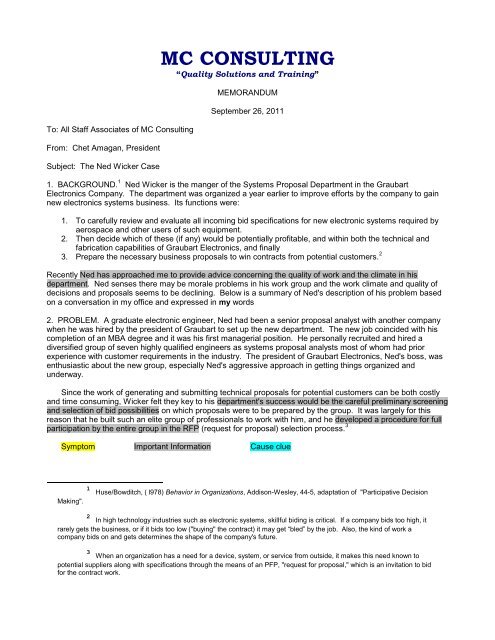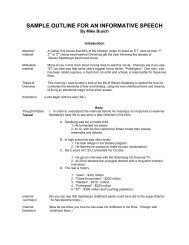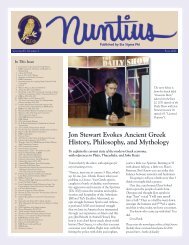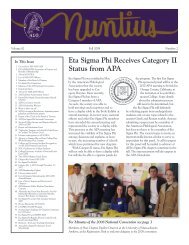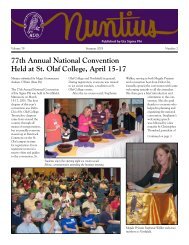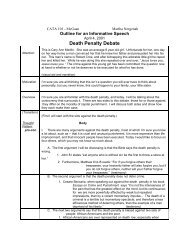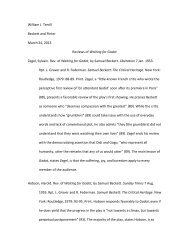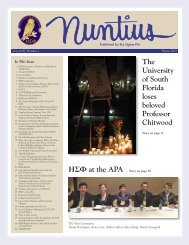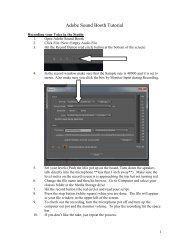The Ned Wicker Case
The Ned Wicker Case
The Ned Wicker Case
- No tags were found...
You also want an ePaper? Increase the reach of your titles
YUMPU automatically turns print PDFs into web optimized ePapers that Google loves.
To: All Staff Associates of MC ConsultingFrom: Chet Amagan, PresidentSubject: <strong>The</strong> <strong>Ned</strong> <strong>Wicker</strong> <strong>Case</strong>MC CONSULTING“Quality Solutions and Training”MEMORANDUMSeptember 26, 20111. BACKGROUND. 1 <strong>Ned</strong> <strong>Wicker</strong> is the manger of the Systems Proposal Department in the GraubartElectronics Company. <strong>The</strong> department was organized a year earlier to improve efforts by the company to gainnew electronics systems business. Its functions were:1. To carefully review and evaluate all incoming bid specifications for new electronic systems required byaerospace and other users of such equipment.2. <strong>The</strong>n decide which of these (if any) would be potentially profitable, and within both the technical andfabrication capabilities of Graubart Electronics, and finally3. Prepare the necessary business proposals to win contracts from potential customers. 2Recently <strong>Ned</strong> has approached me to provide advice concerning the quality of work and the climate in hisdepartment. <strong>Ned</strong> senses there may be morale problems in his work group and the work climate and quality ofdecisions and proposals seems to be declining. Below is a summary of <strong>Ned</strong>'s description of his problem basedon a conversation in my office and expressed in my words2. PROBLEM. A graduate electronic engineer, <strong>Ned</strong> had been a senior proposal analyst with another companywhen he was hired by the president of Graubart to set up the new department. <strong>The</strong> new job coincided with hiscompletion of an MBA degree and it was his first managerial position. He personally recruited and hired adiversified group of seven highly qualified engineers as systems proposal analysts most of whom had priorexperience with customer requirements in the industry. <strong>The</strong> president of Graubart Electronics, <strong>Ned</strong>'s boss, wasenthusiastic about the new group, especially <strong>Ned</strong>'s aggressive approach in getting things organized andunderway.Since the work of generating and submitting technical proposals for potential customers can be both costlyand time consuming, <strong>Wicker</strong> felt they key to his department's success would be the careful preliminary screeningand selection of bid possibilities on which proposals were to be prepared by the group. It was largely for thisreason that he built such an elite group of professionals to work with him, and he developed a procedure for fullparticipation by the entire group in the RFP (request for proposal) selection process. 3Symptom Important Information Cause clueMaking".1 Huse/Bowditch, ( l978) Behavior in Organizations, Addison-Wesley, 44-5, adaptation of "Participative Decision2 In high technology industries such as electronic systems, skillful biding is critical. If a company bids too high, itrarely gets the business, or if it bids too low ("buying" the contract) it may get “bled” by the job. Also, the kind of work acompany bids on and gets determines the shape of the company's future.3 When an organization has a need for a device, system, or service from outside, it makes this need known topotential suppliers along with specifications through the means of an PFP, "request for proposal," which is an invitation to bidfor the contract work.
<strong>The</strong> procedure called for all RFPs to be distributed and given a preliminary evaluation by individual analysts, whothen made informal written "bid/no bid" recommendations to <strong>Wicker</strong> on Friday each week. On Mondays, a fullmorning review meeting involving the entire group was to be held, at which time each analyst would presentin detail those proposals he had reviewed the preceding week and lead the group in discussing them. AfterRFPs had been reviewed in this way, final selections for making proposals were to be reached by groupconsensus.<strong>The</strong> RFP review and selection procedure seemed to work effectively for the first three or four months, andthree proposals submitted by the department resulted in major new contracts for the company. In the Mondaymorning review meetings about various RFPs discussions were lively and involved the whole group. Frequentlythe sessions ran over into the early afternoon. <strong>The</strong> variety of individual backgrounds, consciously selected by<strong>Ned</strong>, provided the group with a broad technical perspective for approaching its task. On only two occasions,based on information he had gained from top management staff meetings, <strong>Ned</strong> found it necessary to overrulethe group's decisions. This was not done high-handedly, however, and he was able to lead members to see thewisdom in his final decision.At the Monday meeting following the announcement of the second contract won by the group, the presidentpaid a surprise visit just before lunch with a bottle of champagne for <strong>Ned</strong> and the group to show his appreciationof their efforts to date.While <strong>Ned</strong> was very pleased with the quality of decisions made by the group during the first several weeks,two things began to bother him. Although the number of proposals being reviewed remained about the same,each successive week the Monday morning meetings seemed to last longer and would soon consume the entireday, a luxury he felt the department couldn't afford. He also had a nagging feeling that, as the manger, heneeded to be better prepared to discuss the merits of the RFPs in order to assist the group in reaching thesoundest decisions.Since he received the written recommendations on Fridays, he decided to familiarize himself with them overthe weekend and to arrive at his own tentative conclusions and priorities for making bid/no bid decisions of eachRFP. His purpose was to have answers ready which might speed up group discussion on Mondays, but to do soin a way which did not directly influence members of the group as to his tentative conclusions.Except for the fact he had less time for golf and weekend household chores, this additional effort on <strong>Ned</strong>'spart appeared to bear results. And although the group's batting average with successful proposals declined inthe second quarter, he felt better prepared on Monday morning, and the meetings began to shorten withdiscussions more to the point. This had the dual advantage of enabling the group to handle a larger number ofproposals in the meetings and also freed up valuable time for the analysts to do the on-going work of thedepartment.A disquieting thing began to develop, however. Gradually, discussions in the group became more formaland at times, recently, became a dialogue between <strong>Ned</strong> and to analyst who had done the preliminary evaluation.<strong>The</strong> final blow came this morning, when the meeting lasted merely forty-five minutes, with <strong>Ned</strong> doing most of thetalking. Since he considered this review meeting to be the heart of the RFP selection process, <strong>Ned</strong> becamealarmed. While he still had complete confidence in the men and women he had selected, he felt more and morethat in the review meetings they were holding back their ideas and technical judgment, both of which he knewwere crucial for arriving at the soundest bid/no bid decisions. As he mulled over the situation on his way tolunch, one of the analysts in the group who had received the second highest performance rating stopped <strong>Ned</strong> tosay he was leaving to take a position elsewhere.3. CLIENT REQUEST. <strong>Ned</strong> has come to MC Consulting for advice on two issues. First, did he make any errorsin designing and implementing the new RFP decision system? Second, what should he do next?4. ACTION REQUIRED. I am asking each employee to write a position paper on this case providing possibleanswers to <strong>Ned</strong>”s questions. Currently we have only the information above to go on.SUSPENSE DATE: 9/28/2011
Cause 1. Lower feedback yields less information/wisdom on recommendations (poor verticalComm resulting from barriers (structural and interpersonal) to vertical Comm.)Cause 2. Motivation damaged due to HR satisfaction issues. Analysts feel devalued, climate moretheory X or traditional. Hertzberg dissatisfiers come into play.Cause 3. Procedure change cause culture shift toward time saving over quality work, lessentrepreneurship,people matter messages down.


